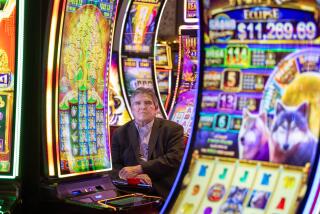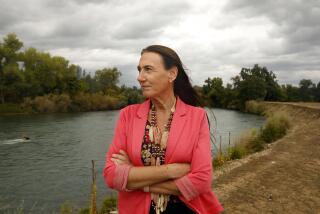Foreclosure Filed Against Planned Cudahy Card Club
- Share via
CUDAHY — In a move that threatens to dash a developer’s four-year effort to build a poker parlor here, a title company has started foreclosure proceedings on a two-acre parcel that was to be the site for the club.
The action came after Charles King, promoter of the Silver Saddle Casino, fell more than $60,000 behind in payments for the land his firm purchased last March.
If the money is not paid by late January, King could lose the property in a foreclosure auction, a lawyer for the firm that sold the property said this week. King, however, insists that the matter will soon be settled and that he expects the card club to be in operation by spring.
Even if King can do that, he faces yet another test. An effort has been launched to repeal the city ordinances that authorized a card club in Cudahy.
Petition Circulated
Georgia Scrivner, 70, said she and a dozen members of the Church of God in Cudahy plan to begin collecting the 350 signatures needed to put an anti-gambling initiative on the city ballot in April, 1986.
“I’m doing this because the people of Cudahy have been misled,” said Scrivner, who for the past 20 years has opposed efforts to bring gambling to Cudahy. “Look how long he has been saying he’d open that poker parlor. He has not come through.”
King has missed several deadlines set by the city for the club’s development but has won extensions from the City Council. The club originally was to have been in operation by September.
A former real estate agent in South Gate who grew up in nearby Huntington Park, King began pushing his plans to build a 100-table club in Cudahy about four years ago. As King billed it then, the club was to be the world’s largest poker palace, pumping $1.9 million a year into municipal coffers. City voters legalized gambling in December, 1982, and a short time later King’s firm, Tanlo Inc., was selected to develop the club.
Backing Fell Through
The firm attempted in 1983 to purchase 10 acres for the club, but the deal foundered when financial backing fell through. In March, however, Tanlo bought the two acres at Wilcox Avenue and Patata Street in south Cudahy for $541,000.
A 7,000-square-foot, cinder-block building on the site once housed an automobile smog-control station. Tanlo currently has its headquarters in the building, which King has said would either be demolished or altered to accommodate a card club with about 40 tables.
In late October, Ticor Title Insurance Co. of California began the foreclosure proceedings after Tanlo fell behind in its quarterly payments to Hamilton Test Systems California Inc., the smog-control firm that sold the land.
More Than $40,000
According to a foreclosure document filed with the county Oct. 23, Tanlo owes Hamilton Test Systems more than $40,000. Charles Montgomery, assistant counsel for Hamilton Test Systems, said that since that document was filed Tanlo has missed another $20,000 quarterly payment that was due Nov. 21.
Montgomery said that Tanlo could escape foreclosure by paying the $60,000 it owes his firm. If the money is not paid by late January, the property likely will be sold, he said.
In a telephone interview Tuesday, King said the process won’t get that far, but he refused to elaborate on why Tanlo has failed to make the payments or what the firm would do to come up with the cash to avoid losing the south Cudahy property.
But card club opponents question whether King will be able to dodge foreclosure.
Betting on Foreclosure
Bill Colon, a Cudahy resident and former co-owner of Tanlo who is now a King foe, said he is betting against the poker club promoter.
“I don’t think he’ll be able to meet those deadlines,” Colon said. “It’s because of history. His track record isn’t very good at being able to meet deadlines.”
Colon, who has been advising Scrivner on her anti-gambling crusade, pointed to King’s inability to meet construction deadlines the council had originally set.
After Tanlo’s efforts to purchase the 10-acre parcel fell through, King failed to meet a December, 1983, deadline for beginning construction.
The council held several hearings on the matter and finally decided to give Tanlo until May, 1984, to have the club constructed. When Tanlo could not meet that deadline, the council again extended the time limit, setting a September, 1985, deadline to have the facility operating.
That deadline was rapidly approaching when the council decreed last May--on a 3-2 vote with Councilmen John Robertson and Joseph Graffio opposed--that King had “completed construction” by purchasing the cinder-block building on the two acres in south Cudahy and lifted the requirement that the club be in operation by September.
Since King bought the building, it has remained essentially unaltered.
More to Read
Inside the business of entertainment
The Wide Shot brings you news, analysis and insights on everything from streaming wars to production — and what it all means for the future.
You may occasionally receive promotional content from the Los Angeles Times.










